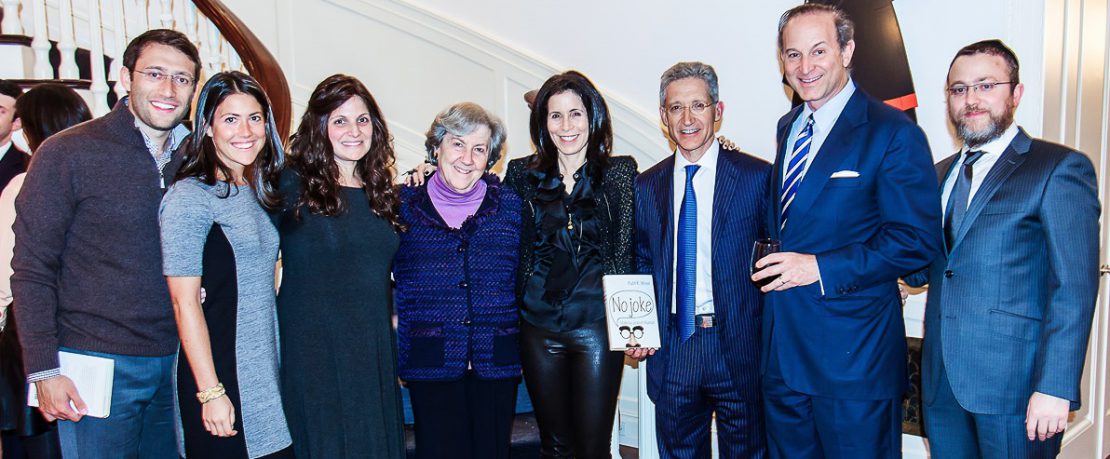What is Jewish humor? Is this a serious question? A laughing matter? Jewish humor and Jewish identity—are you kidding?
Speaking about her book No Joke, Making Jewish Humor, Professor Ruth R. Wisse used the opportunity for some candid talk that left her listeners reflecting on the not-so-funny topic of Jewish identity, even as she made them laugh.
Wisse, the Martin Peretz Professor of Yiddish Literature at Harvard University, explored the way Jews have used humor, especially self-deprecating humor, to give them the last word against their enemies. Drawing upon Jewish references in a way that the “goy” had no access to, they could beat their offender to a sharper punch line, denying the enemy the pleasure of poking fun at the Jew.
Speaking Wednesday evening at an intimate NYC event organized by Chabad of Harvard for alumni and parents of Harvard students, Professor Wisse considered the evolution of Jewish humor. Once an expression of a shared identity informed by knowledge of Torah, Talmud and cultural particularities, today, she observed, American Jews are so removed from Jewish knowledge, they are no longer able to relate to Jewish humor.
Sadly, what sometimes passes now for Jewish humor is Holocaust jokes, because that is almost “the only thing that most American Jews know” about Judaism. Wisse referred to the recent Pew study that found that the majority of Jews consider Jewish humor a most important aspect of their Jewish identity, “while only 19% felt that observance is important.”
“What has become of this people? We Jews are making a laughing stock of ourselves,” she said ruefully.
Changing the Face of Jewish Life at Harvard
Friend and advisor to Chabad, the author of The Modern Jewish Canon: A Journey Through Language and Culture among other books, Wisse has also been professor of comparative literature at Harvard for 21 years. “One of the most wonderful things that happened to me since coming to Harvard is Chabad.”
Contrasting Chabad with other campus Jewish student organizations, Wisse said that “Chabad has changed the face of Jewish life at Harvard.” Chabad alone, she continued, knows how to welcome students from every Jewish persuasion (or none at all) with warmth and openness, while never wavering about its own identity.
“So many Jewish student organizations try to be everything to everyone, but there’s no ‘there’ there. At Chabad, although there’s no pressure on you, you know exactly who your hosts are and what they represent.”
Parents and alumni nodded in agreement, clearly grateful for the leadership, the home and hospitality Rabbi Hirschy Zarchi and his popular wife, Elkie bring to the student experience. Many of the guests graduated years ago, but they continue to keep up with the Zarchis.
Elana Resnick, a practicing MD who graduated Harvard in 2002, and her husband Jed (2000), met at Harvard and were later married by Rabbi Zarchi. “That should say it all,” said Elana.
But looking beyond their own experience with Chabad at Harvard that reinforced their Jewish identity, Jed reflected on the indispensable role Chabad plays even for those students who don’t necessarily take on greater Jewish observance.
“It’s not an exaggeration to say that Harvard graduates make up a significant portion of the leadership population—in all fields. The experience with Chabad at Harvard for these leaders, regardless of the field they are in, offers them a critical connection to their heritage,” that will serve them and the Jewish people as they move on in their careers.
Hosted at the gracious Upper East Side home of Teri and Barry Volpert whose daughter Lauren is a freshman at Harvard, and led by Chabad Alumni Chair Rebecca Rohr Ritter, the event was one of many annual programs that focus on keeping alumni connected to each other and Chabad.
In his remarks, Rabbi Zarchi noted that when parents bring their freshies to campus, “they don’t drop their children off at Chabad. Rather, Chabad is a place where children bring their parents,” he said, quoting the prophetic verse from Malakhi: “The hearts of the fathers will be returned to their children.”
The majority of Jewish students come to Harvard with little Jewish baggage, Zarchi said. With no prior prejudices to rail against, they come as “’open books,’ responsive and interested to learn about Judaism in a meaningful way,” and eventually, share the experience with their parents.

Be the first to write a comment.